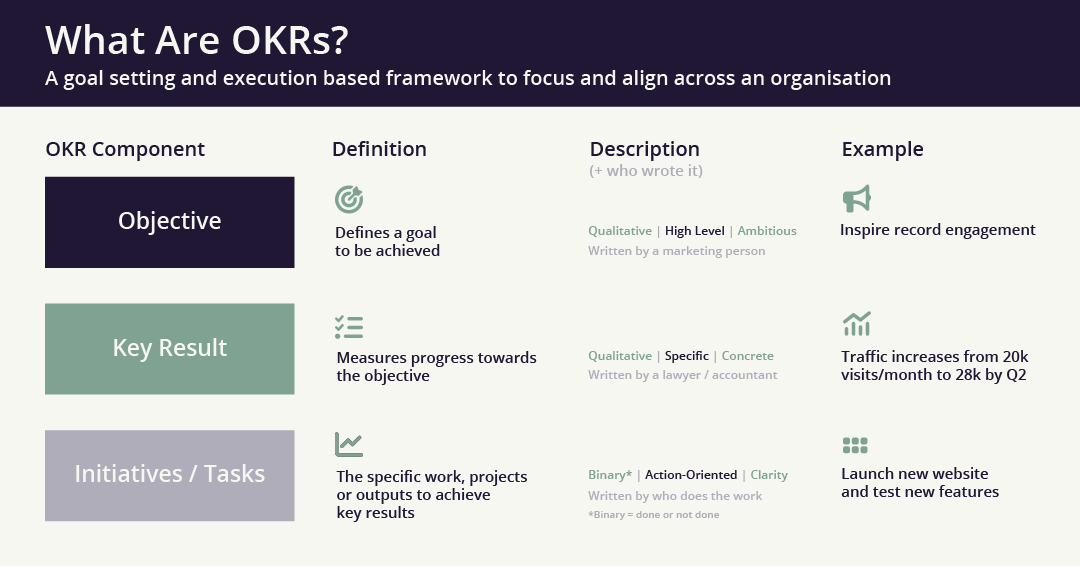In order for me to explain the benefits of OKRs, let me first paint you a picture. In most large organisations (at least the ones that I worked in) there tends to be a particular trend. Leaders and senior management create a huge vision, strategy, and mission statement for their company. Then on the other side of the business, the everyday employees are working to their own goals, KPIs and various milestones. And in most cases, these are completely separate to, and will have little-to-no implication on the wider company mission.
Being a finance leader, we’re uniquely placed, as we’re often exposed to both sides of this problem. We’re there to help plan out the company mission and the strategy to execute it, and then we go back to our day jobs. We work with 100 metrics, we run budgets, and we do all these KPIs, but very few of these are in relation to the wider business strategy.
And this is where OKRs come in!
What is an OKR?
To put it literally, OKRs stand for “Objectives and Key Results”. Developed by Intel in the 1970s, OKRs are a strategy execution framework that enables organisations to link the day-to-day work they do with the top-level goals, objectives, and strategy of the company.
Since their inception, OKRs spread into Google in the ‘90s, helping them to become world leaders in the Search industry. From there it crept its way across Silicon Valley, into the big Fortune 500 companies, and is now found in successful organisations all across the world.
What are Objectives
Objectives are the big, audacious goals that an organisation is trying to achieve on a long term, annual, or, in some cases, quarterly level. These are qualitative and high level such as: “Our customers love us”, “We generate tangible business impact” or “Our role helps others succeed”.
The problem with most objectives is that people are never really clear about whether or not they’ve achieved them. You might think that reading the examples above – what do they even mean?? Furthermore, the lower down the ‘ladder’ an employee is, the less aware they normally are of the overall company objectives. This is one of the main issues that OKRs aim to fix.
What are Key Results
Key results are the measures if success that are crystal clear on what the objective us. By setting and assessing these Key Results, we can benchmark and monitor our progress towards the overall objective. KRs are measurable, time-based, and should be very stretching, but just about achievable. As a general rule of thumb, there should be 3-5 KRs for each objective that you set, with generally a maximum of 3 objectives for any timeframe.
You might already be familiar with Key Results in the form of KPIs. It’s something that I have used throughout my whole career, and something everybody in business should be familiar with. But while KPIs can relate to any area of the organisation, big or small, Key Results in an OKR framework are the most important KPIs that will lead to success in an organisation’s Objectives.

What’s so great about OKRs
The great thing about OKRs is that they enable an organisation to focus not on everything, but on the most important things that they need to do. That way, they can prioritise the most important and tie back day to day tasks to the overall vision and mission of the organisation.
The ‘Big Rocks’ analogy
One way I like to explain this is through the Big Rocks Analogy. Picture a glass jar, and a pile of assorted rocks and sand. Your objectives are the big rocks, Your Key Results are the smaller rocks, your set tasks are pebbles, and your every day tasks (emails, meetings etc.) are the sand. If you try and put the sand in first with the pebbles and smaller rocks, you won’t have any space left for the big rocks. However, if you put the big rocks in first, then the smaller rocks, the pebbles and finally the sand, each will fit in the gaps between the last.
The same is true at work. Most of us fill our days with emails, meetings, and bits and pieces to get our day job done. But if we focus on just two or three tasks, and how those apply to the overall business objectives, we would all make much more progress towards the things that really matter.
Need help setting your own OKRs?
In partnership with Auxin OKR, we help teams and individuals to create world class OKRs and implement them across the entire organisation. One of the best part of this is not always the actual milestones and planning that come out of it, but the shared understanding of the business goals and mission.
Now, you might be thinking “I’ve tried OKRs before and they didn’t work for me/my organisation”. And while it might be true that your OKRs weren’t successful, this doesn’t mean that OKRs won’t work for you. With my background and experience in setting key results, and Auxin’s OKR expertise, we help organisations to realign their OKRs, making sure they’re using the methodology right, in a way that will bring positive change to their organisation.
If this sounds like something you’re interested in, get in touch with me today and let’s start planning for your future success!


